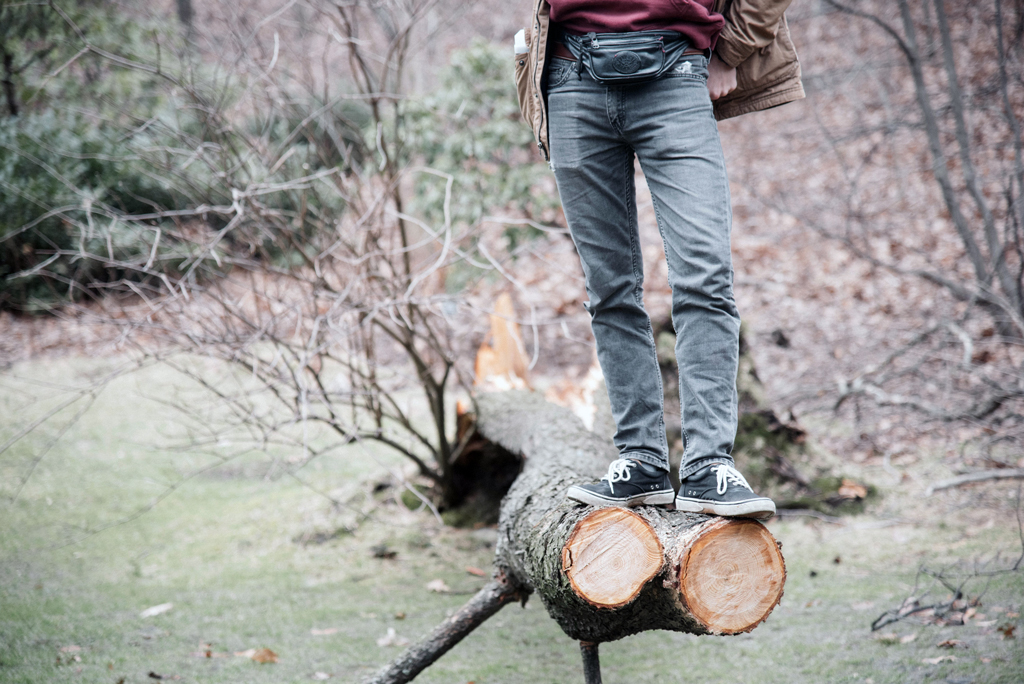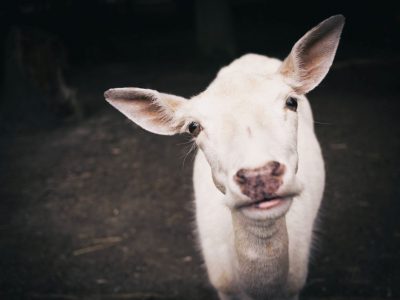
Laura Moretz
THE FALL ZONE
First thing that morning, a woman told Henry his crew must not cut her tree’s branches. She looked as though she wouldn’t survive if he cut the thinnest twig from the huge willow oaks in front of her house. Fully dressed and made up before eight a.m., she clutched the notice that his crew had hung on her door knob a few days before. She argued for the integrity of the tree as though he had suggested cutting the arms off her grandchildren. A branch as large as a trunk had shot over the power lines. He gave her his supervisor’s phone number. Her hands shook as she dialed the number on her flip phone, murmuring, “murder, murder, murder.” They moved their trucks to the next house—on this road, almost all the properties had tree limbs extending over the wires.
There, a woman came across the lawn in her pajamas and a loose sweater, her arms crossed like a shelf under her breasts so he wouldn’t see them shaky and unsupported. I’ll be damned, if this isn’t the day from hell. He knew what she would say: “you can’t cut our tree” and “it will fall over backward if you take off the front” and “it has never knocked out power,” and he would have to give her his boss’s number and hold off cutting, screwing up the work flow all down the road.
But she smiled, looked right in his eyes as though he were her equal and not the angel of death, and said, “I just wondered if you might cut one of our dead limbs, too,” and she pointed, so they walked together and she showed him where a major limb jutted out, silver and leafless, on the other side of the massive trunk. “My husband wanted me to ask.”
“That one will come down anyway—it’s on the lateral—it’s got to go.”
“My husband wants it down—I hadn’t noticed it was dead, disguised by all the living branches.” She looked embarrassed to ask this favor.
He didn’t tell her that they didn’t strictly need to cut it. Instead, he said, “You’ve got tomatoes just rottening on the vine.” He’d seen them when he’d been placing flags for the fall zone, just before she came from her carport. Orangey globes that he hadn’t seen often enough that summer, what with working seven-day weeks cleaning up one disaster after another. When he got back to North Carolina after cleaning up from Irma, his mother’s tomato vines had dried up.
“Do you want some? It’s crazy how they came so late this year. I can’t keep up.”
“Wouldn’t mind one for my sandwich.”
“You should take a couple,” she said, walking away toward the house.
He took a closer look at the tomatoes. Some had black mold spots and thin skin covering rot, others needed a few days on a windowsill before they’d be ready, and he wanted one for his sandwich today. It wouldn’t do to let the fruit roll around on the floorboard of the truck. Someone would step on them, and it would be a mess. Was that her watching from the window? Maybe he shouldn’t take any. It’s not like he was doing any big favor, getting that limb down.
He had to go and set up another zone on the main road, and when he came back, she walked outside again, now with a bra under her sweater, with three tomatoes in a plastic grocery bag. “I had some on the counter that are just perfect. We’re not eating them fast enough.” This woman could not stop apologizing for her good fortune, for this life where she had a husband and a garden and no bigger worry than getting down a dead limb.
The bucket truck was anchored at the base of her tree. He pointed to a fungus way up the trunk, and asked her, did she know what that meant?
She said she had no idea.
“It will kill the tree, because it’s inside it already. The water came down that dead limb and into the opening and started a sickness.”
She looked stricken, as though he’d told her that her child was dying.
“How long?” she asked.
“It’ll take a lot of years, maybe ten,” he said.
She seemed to relax a little. Then she showed him where the roots were rotting—did that have to do with the fungus?
“When you see mushrooms sprouting around the trunk, it’s a sign of rot.”
“There have been mushrooms all along these roots!” she said. “It’s where the chipmunks make their homes.”
“Ma’am, I can tell you about chipmunks.” He shook his head.
“We’ve got so many, we’ve been trapping them and taking them to the park.”
“I trap them, and I feed them to my black snakes.”
Her face said she didn’t think worse of him, in fact she looked as though she wanted to know more, but the limbing man up in the bucket had started his saw, and they had to get out from under the tree and the wires. Here was a woman who didn’t know when she was in danger.
“Ma’am we’ve got to get out from under the tree when he’s cutting.”
She followed him to the driveway.
The wood chips flew in the air like a thousand moths as she stood by him in the driveway near a telephone pole. He had his safety glasses on, never took them off all day, but she had nothing and was covering her eyes with her hands like a visor. Some limbs bounced softly onto the wires and balanced there, while others fell to the ground.
“Would black snakes climb this tree?” she asked.
“They would eat them squirrel babies out of their nests.” He told her about black snakes and how he liked to catch the five-footers and keep them, and she seemed interested, so he told her about the dozen deer he skinned last winter, the fifty-odd rabbits he’d shot, and even more squirrels—all of which he ate—and the catfish he’d caught in the Yadkin River as long as her arm, which was good eating, too.
He cut glances at her rounded belly, her hair, both colored and gray, all the while tracking the man who whirred the bucket up and down and lopped off branches.
“It’s my son up there.” He surprised himself, telling her this. “He’s twenty-five. I raised him since he was five, both Mama and Daddy to him. I broke down and cried when he moved out at eighteen. Couldn’t stand for him to go.”
A large limb fell and hung on the wires, seeming as light as a row of perched birds.
“Looks like he came back.”
They watched another limb fall.
She said something about how it wasn’t as hot as it had been, and he said he liked it best when the temperatures were in the thirties. Those times in the winter or late fall when he skinned deer outdoors and left some of the parts on a table at night for raccoons and red-tailed hawks to get. He didn’t hire a butcher service the way other hunters did. He liked being outside, cutting the meat by the open fire, canning it at a table built for that purpose.
The bucket arm was at full extension.
“What about those?” She pointed over his son’s head.
“That’s canopy. We won’t get that cut—no way to do it.”
He didn’t want to leave the woman’s side, but he had to do his job. With his picker, he plucked the newly fallen branches off the wires. He wanted to tell her about learning to hunt with his father, who showed him how to load and point a rifle and how to track animals, and then sent him out in the woods telling him to bring back squirrels and rabbits for supper, counting on him to do it. He wanted to sit at her table, and tell her about his hunting, and eat his sandwich with her, away from the men.
She yelled out from the driveway, “Don’t forget to get some green tomatoes. Take all you want.” She was gone into the house.
He wanted a dozen green tomatoes for canning, and he took them. He left her a few, even though she’d waste them. He’d kill a deer that weekend and dice the green tomatoes for chow chow.
◊
All that week, while they cut limbs throughout her neighborhood, he noticed when her car was in her carport, and when it was gone, but he didn’t see her again, even when he directed his chipping crew to dump two loads of woodchips in her garden where she’d agreed they could dump them. Don’t cover the tomatoes, she’d said.
The next time this job came up would be ten years from now, and by that time he’d be out on disability or retired. He had to accept it—women like her were not for him.
◊
When cold weather came, Henry enjoyed a stretch of good hunting, then a hard freeze came followed by an ice storm, and, to top it off, a heavy snow brought down limbs and power lines all around the city. His crew used spotlights to make quick work of dozens of fallen trees and limbs, and, despite the snow and the dark, he recognized her place when they were sent to her neighbor’s house, the neighbor who’d first complained the day he worked on that road last summer. As a result, his boss had told them to go easy on her pin oak. Now the limbs they’d left for aesthetic reasons had knocked out power down the street, which would put his boss’s job in danger. He hoped his boss wouldn’t get sacked. There was nothing he could do about a woman like that.
This time, he was in the bucket while his son warmed up in the truck, and a third man watched from below.
While he considered the best path for the large limb’s fall, a light came on in the woman’s carport, and he saw two figures come out. It had to be the woman and her husband. They’d left their warm bed or their fire or their generator to watch him work, and there was no way she could know that he was the man she’d given tomatoes. She’d see him now as one of those tree men. He cut the the trunk-like branch—more than a foot around—and it landed on the sodden snow.
The couple had disappeared when he looked back their way. He lowered his bucket and climbed out.
In the truck, his son poured hot coffee from a thermos and extended the cup. “Isn’t that the house where the lady gave you tomatoes?”
“Whatever garden she had is gone under this mess,” he said.
“She had some green ones that you canned up.”
“That sounds right,” he said. A jar of the chow chow was in his fridge. He savored it with his venison. “She wasted her garden. Some people.”
 Laura Moretz is a writer with fiction published in r.kv.r.y quarterly literary journal, Cutthroat: A Journal of the Arts, Stoneboat, and forthcoming in The Forge. Two of her stories have been nominated for Pushcart prizes. She has won the Rick DeMarinis Short Fiction Prize and is an assistant editor for Boulevard and The Review Review.
Laura Moretz is a writer with fiction published in r.kv.r.y quarterly literary journal, Cutthroat: A Journal of the Arts, Stoneboat, and forthcoming in The Forge. Two of her stories have been nominated for Pushcart prizes. She has won the Rick DeMarinis Short Fiction Prize and is an assistant editor for Boulevard and The Review Review.
Image credit: Mark Koellmann on Unsplash
Read more from Cleaver Magazine’s Issue #22.



